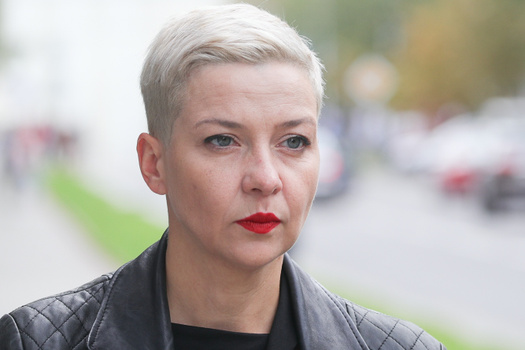
‘Not a voluntary exit’ After top Belarusian opposition leader disappears in Minsk, she’s arrested at border with Ukraine
Мы говорим как есть не только про политику. Скачайте приложение.
Maria Kolesnikova (Maryia Kalesnikava), one of the leaders of the Belarusian opposition, was arrested at the border with Ukraine on the morning of September 8, says the Belarusian State Border Committee. State officials say Kolesnikova and two other members of the Belarusian opposition’s Coordination Council, Anton Rodnenkov and Ivan Kravtsov, drove between Belarusian and Ukrainian border checkpoints. After noticing a border guard officer, claims the State Border Committee, the car sped up suddenly and left Belarusian territory after “shoving” Kolesnikova from the vehicle. Ukraine’s border service says Rodnenkov and Kravtsov arrived at the Ukrainian checkpoint, where border control officers started inspecting them. The Belarusian State Border Committee says these two men were arrested, but Ukrainian officials deny this.
Belarusian officials tried to deport Maria Kolesnikova from the country, but she tore up her passport and border guards refused to admit her, reported Interfax-Ukraine. Ukrainian Deputy Interior Minister Anton Herashchenko wrote on Facebook that Rodnenkov and Kravtsov had accompanied Kolesnikova before they were expelled from Belarus. “This was not a voluntary exit. They were violently expelled from their native country,” said Herashchenko, saying that (but not explaining how) Kolesnikova prevented her own deportation.
Svetlana Tikhanovskaya has demanded Kolesnikova’s immediate release, as well as the release of other arrested Coordination Council members and political prisoners. “You can’t hold the [Belarusian] people hostage. By kidnapping people in the middle of the day, Lukashenko demonstrates his own weakness and fear,” said Tikhanovskaya.
Kolesnikova won’t leave Belarus unless she’s forced from the country, says her lawyer and fellow Opposition Coordination Council Presidium member Maxim Znak, who says he discussed contingency plans with Kolesnikova, Rodnenkov, and Kravtsov on September 6, in case the state authorities threatened them with repression if they refuse to leave Belarus, which is what happened to oppositionists Pavel Latushko (Paval Lathuska) and Olga Kovalkova. “Maria Kolesnikova’s position was clear: she would leave Belarus under no circumstances, except by force. At least as of the night before yesterday [September 6], she was absolutely sure of this,” says Znak, arguing that she should be released soon because there are no legal grounds for her arrest, he insists.
The Belarusian state media has released a video where Ivan Kravtsov says he’s decided to leave the country. The footage first appeared on the Telegram channel of ATN News (a subdivision of the Belarus-1 state television network). The state news agency BelTA also published a recording with Kravtsov’s statement. It remains unknown under what conditions his remarks were recorded. Kravtsov himself has yet to comment on the video. The ATN News Telegram channel also reported that Kolesnikova, Rodnenkov, and Kravtsov supposedly broke through the Belarusian border. (The video shows a passenger vehicle passing through the border checkpoint without incident.)
The Kremlin says it hopes for an explanation from Belarusian officials about what happened to Maria Kolesnikova. President Putin’s spokesman, Dmitry Peskov, told reporters on Tuesday that kidnapping “can’t be condoned in any way,” but he emphasized the need to distinguish arrest from abduction. “At the same time, we don’t yet have detailed information about what happened to her, and the information coming in is highly contradictory. We hope the situation will be clarified and that we’ll hear whatever explanations or announcements are needed to shed light on what happened,” said Peskov.
A day before they were arrested, Kolesnikova, Rodnenkov, and Kravtsov stopped responding to messages. Eyewitnesses say masked men in civilian clothes abducted Kolesnikova in downtown Minsk, dragging her into a van labeled “Communications” and drove off in an unknown direction. The country’s police, Investigative Committee, and State Control Committee say they have no knowledge of Kolesnikova’s arrest, and the Belarusian KGB has declined to comment on the matter. Late on September 7, her family members alerted the police about her disappearance.
Text by Alexander Baklanov
Translation by Kevin Rothrock
(1) Maria Kolesnikova
In July, she became one of the three leaders of the united opposition campaign for presidential candidate Svetlana Tikhanovskaya (Svyatlana Tsikhanouskaya). The other two opposition leaders — Tikhanovskaya herself and Veronika Tsepkalo (Veronica Tsapkala) — were forced to leave Belarus immediately after the election in early August. Kolesnikova remained in the country and joined the Presidium of the opposition’s Coordination Council, an initiative by Tikhanovskaya. The Belarusian authorities are now investigating the Coordination Council for crimes against the state.
(2) What happened to them?
The Belarusian authorities forced both to go to Poland. Former Culture Minster Latushko left after the Belarusian KGB threatened criminal prosecution. Officials removed Kovalkova from a detention center in Minsk where she’d been sentenced to administrative arrest and deported her to Poland. Kovalkova had said she wouldn’t leave Belarus.